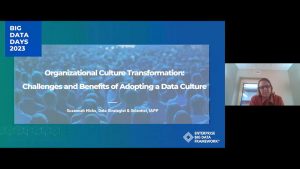PROGRAM DETAILS
 3 Years
3 Yearsto complete your degree
 Online
Onlinecareer-focused curriculum
 7-week
7-weekcourse length
 Lock-step
Lock-stepdissertation model
Program Overview
Organizations expect their senior-level leaders to foresee shifts in the horizon of their industry and have strategies to adapt to change in their field. As companies continue to evolve, the same is expected in the next generation of business leaders.
If you’re looking for a degree that can prepare you for a senior leadership role and give you the insight into delivering change in your organization, let Johnson & Wales University’s Doctor of Business Administration (DBA) Organizational Development concentration set you on the path towards an executive-level leadership position.
Our robust curriculum is designed to delve into critical areas of business, including large-scale business transformation, analytics, and executive decision-making. We give our students the tools needed to attain high-level leadership positions and prepare them to excel in those roles, no matter the industry. And our lock-step dissertation model is designed to help you complete your degree on time, so you can step into your new role seamlessly.
Enroll in Johnson & Wales University today, and begin the journey to the next step in your career.
This program is offered in collaboration with JWU’s College of Hospitality & Business.
What You'll Learn
- Design, conduct and present applied research that addresses practical business problems.
- Employ advanced communication skills to share complex information, organizational vision, and actionable guidelines within business environments.
- Apply contemporary business leadership theories, knowledge of core business functions and evidenced-based practice to address issues faced by today's senior leadership.
Tuition & Fees
At Johnson & Wales University, we believe a high-quality education should help you reach for your career goals, so we are constantly working to provide competitively-priced college tuition.
DBA Organizational Development Curriculum
Your coursework for this fully online Doctor of Business Administration degree covers advanced business concepts with a high-level organizational development focus — from executive decision-making to business analytics to leading large-scale organizational changes, and much more. Those enrolled in the DBA Organizational Development concentration will take the following courses:
| Organizational Development Concentration Course | Course Description |
| Advanced Strategies in Organization Development | This course focuses on aligning organizations with rapidly changing and complex environments through organizational learning, knowledge management and transformation of organizational norms and values. Key concepts of organizational development theory are discussed, including organizational climate (mood or personality, including attitudes and beliefs that influence members' collective behavior), organizational culture (deeply-seated norms, values and behaviors that members share) and organizational strategies (how an organization identifies problems, plans action, negotiates change, and evaluates progress). |
| Organizational Interventions – Disruption and Change | Organizations experience both externally imposed disruption and internally planned changes. This course prepares students to diagnose the internal and external environments when disruption and change occurs and develop plans to support the organization as it undergoes changes. Students utilize research in several fields to make informed decisions and collect research within organizations to make decisions, including psychometric assessments. The course also prepares students to understand the psycho-social impact of such changes on the workforce and make appropriate group-level and individual-level interventions. Students develop coaching and process consultation skills for future application in organizational development. |
| Leading and Managing Large-Scale Transformation | This course focuses on research, evaluation and application of management theories pertaining to large-scale organization transformation. This course builds upon the management foundations explored in the core courses of the program and complements the organization development concentration courses. Large-scale transformations of organizations are complex and multifaceted, and consequently require leaders to adopt numerous lenses to effectively understand and influence change. The four key theoretical frameworks are explored: 1) systems theories, 2) complexity theories as they pertain to organizational leadership, 3) global/international dimensions of organizational culture and 4) organizational ethics theories. Students analyze cases and synthesize scholarly research related to their industry/and or interest area to produce a literature review supporting their doctoral research. |
For the most up-to-date and complete course listing information, as well as full course descriptions, visit our catalog.
To view the full Doctor of Business Administration curriculum, visit the Courses tab on the DBA home page.
If you have additional questions about the program, contact Admissions Associate Ashley Slattery.
Application Requirements
Leadership Experience Requirement
Applicants must have a minimum of 5 years of professional experience in a management position involving direct responsibility for leading and supervising people (e.g., managing teams, departments, or projects with subordinates reporting to you). This ensures that all admitted students enter the DBA program with substantial real-world leadership experience, enabling richer peer-to-peer learning, more meaningful application of advanced concepts to complex organizational challenges, and immediate contribution to class discussions and applied research projects.
Academic Performance Requirement
Applicants must hold a business-related master’s degree (or equivalent graduate degree) with a minimum cumulative GPA of 3.0 on a 4.0 scale (or equivalent). This requirement confirms that candidates have already demonstrated the intellectual capability and academic discipline needed to succeed in a rigorous doctoral-level coursework and research.
The DBA is a demanding doctoral program that builds directly on advanced graduate knowledge in business disciplines. Requiring a ≥3.0 GPA in a prior business-related master’s degree ensures that:
- Students enter with proven ability to handle complex graduate-level analytical and writing demands.
- The cohort starts with a consistent academic foundation, allowing faculty to maintain high standards without excessive remediation.
- Candidates are prepared for the qualitative and quantitative research-methods, and theory courses that are prerequisites for a credible doctoral dissertation.
Q&A With DBA Program Director Rex Warren
FAQs: Online DBA in Organizational Development
What are the admissions requirements for the DBA in Organizational Development program?
To qualify for the DBA-OD at JWU Online, applicants must hold a master’s degree (typically in business or a related field) from an accredited institution. They must also have substantial management or people-management experience — specifically, five years of people or team management in industry (or equivalent experience as a business educator) is required. Applicants whose master’s degree is not in a business-related field may need additional relevant experience. As part of the process, applicants must submit official transcripts (from all institutions attended), complete the standard application, and provide any required verification of prior education.
What are the career benefits of earning a DBA in Organizational Development?
Earning a DBA in Organizational Development gives you advanced skills in strategic leadership, organizational change, and evidence-based decision-making. Graduates are prepared to lead complex organizational transformations, design and implement data-driven strategies, and guide high-level teams through change and growth. The degree is a terminal business doctorate, which can enhance your credibility and authority as a senior leader, management consultant, or thought leader. For those interested in academia or teaching, the DBA may also support eligibility for faculty roles or leadership in higher education settings.
What careers can I pursue with a DBA in Organizational Development?
With a DBA in Organizational Development, you can pursue a variety of senior-level and leadership careers, including:
- Executive-level management roles (e.g., CEO, COO, senior management, or other C-suite positions)
- Organizational development leader or director, leading change initiatives, culture transformation, or large-scale restructuring
- Management consultant or business consultant, advising companies on strategy, change management, and organizational effectiveness
- Senior operations or strategic planning roles in corporations, nonprofit organizations, government agencies, or public-sector institutions
- Research-oriented leadership roles applying business research to real-world organizational problems
- Academic or higher-education faculty or administration roles — since the DBA is recognized as a terminal business degree, it can support teaching and leadership positions in colleges/universities






